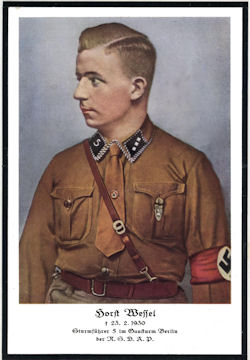Horst Wessel - Aftermath
 With the Enabling Act, the Nazis finally acquired a means to destroy their declared enemies. "'Here I have no justice to exercise, here I only have to destroy and exterminate..."' Göring's threat from March 1933 was the prelude to judicial murder.
With the Enabling Act, the Nazis finally acquired a means to destroy their declared enemies. "'Here I have no justice to exercise, here I only have to destroy and exterminate..."' Göring's threat from March 1933 was the prelude to judicial murder.
The first trial for the killing of Wessel took place in September 1930, still during the Weimar Republic, and it ended relatively unspectacularly with long prison sentences for manslaughter against the main perpetrators. And that sentence was far too lenient for the Nazis.
Nazis, from 1933 onward, took bloody revenge. Of the 16 people convicted for their proven or suspected involvement in Wessel's killing, at least eight died violently during the Nazi dictatorship: Two were murdered in 1933, including the gunman, Albrecht Höhler. Four were killed in concentration camps, and four others survived the concentration camps as political prisoners. They liquidated the main perpetrator and sentenced two peripheral figures, Sally Epstein and Hans Ziegler, who may not have even been involved in the attack on Wessel, to death for murder. Peter Stoll, a third defendant, received seven and a half years in prison. The death sentences were carried out on April 10, 1935, in Berlin-Plötzensee. Only after the Bundestag passed the "Law for the Repeal of National Socialist Unjust Verdicts in Criminal Justice and of Sterilization Decisions of the Former Hereditary Health Courts" on May 28, 2008, did the Berlin public prosecutor's office overturn the conviction of Hans Ziegler, Sally Epstein, and Peter Stoll for the murder of Horst Wessel on February 9, 2009 – 74 years after the executions.
In the spring of 1933, Else Cohn, who had been involved in the assassination attempt as a scout for the crime scene and managed to escape a one-year prison sentence, was murdered by perpetrators who were never identified. In a trial from Jun 15, 1934 against the defendants Peter Stoll (Seaman), ‘Sally’ Epstein Jewish painter), and Hans Ziegler (barber), Epstein and Ziegler were sentenced to death. In fact, their complicity in the crime could not be proven. After Hitler personally rejected a plea for clemency, Sally Epstein, the Jewish communist, was executed by hand axe on April 10, 1934, in Berlin-Plötzensee. It was the first death sentence against a Jew in Nazi Germany.
Ali Höhler was to be brought back to Wohlau on September 20, 1933. However, Höhler never arrived there. A letter from the Gestapo to Prussian Prime Minister Hermann Göring dated September 23, 1933, describes the events: "Shortly before Frankfurt an der Oder, the transport was stopped on the highway by eight men wearing SA caps, field-gray coats without insignia, and long boots, and armed with carbines. During their search of the vehicle, these individuals discovered that the murderer Horst Wessels was among the occupants and demanded his surrender. .. Where Höhler was taken has not yet been determined. However, his death is likely to be presumed." Ali Höhler was by no means the only prisoner to fall victim to an illegal SA murder campaign after the Nazis seized power in January 1933.
The Reich Court later revisited Horst Wessel. It ruled on December 2, 1936 (RGZ 153, 71) that the melody of the Horst Wessel song was fundamentally worthy of copyright protection ("[...] the result is a gripping, rousing, inspiring battle song"). This work continues to preoccupy the courts today with its potential for criminal prosecution. The Federal Constitutional Court has classified the use of the line "The flag high" as "a symbol of an unconstitutional organization": The danger of "reviving National Socialist tendencies as a result of the use of symbols suitable for association" is already present "if the title and such prominent text passages of the official party anthem of the National Socialist German Workers' Party (NSDAP) are reproduced. The title and text have a recognition and identification function.
The first German democracy was bled to death from within: by "hooligans avant la lettre" on both sides, for whom violence is the true "meaningful practice." Horst Wessel epoused s presumptuous love of violence, a virtuous, soldierly longing for leadership, complete with its obsession with weapons, and its raging hatred of democracy and democrats. He was already dead in 1930 and can no longer be held truly accountable for all the crimes of National Socialism.
|
NEWSLETTER
|
| Join the GlobalSecurity.org mailing list |
|
|
|

